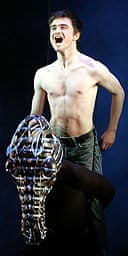Forget all the prurient press speculation about Harry Potter's private parts. The revelation of this revival is that Daniel Radcliffe really can act, proving that his screen appearances as JK Rowling's boy-hero are no flash in the magic pan. His performance also helps to camouflage the fact Peter Shaffer's celebrated ritual drama sometimes betrays its early 1970s origins.
Radcliffe plays 17-year-old Alan Strang: a boy who has inexplicably blinded six horses with a metal spike. And we watch, with fascinated curiosity, as an overworked provincial psychiatrist, Martin Dysart, patiently delves to uncover the motives behind the boy's hideous action. We learn that Alan, the child of a repressed printer and his religiously zealous wife, has become a confused hippophile, sexually and spiritually excited by tactile horseflesh. Even though his impotence with a stable-girl is the source of his crime, the desiccated Dysart still is left envying the boy's capacity for worship.
As a story, it is compelling; and I don't in the least mind that it pursues Shaffer's familiar conflict between Apollo and Dionysus. What disturbs me, 34 years after the play's premiere, is the way Shaffer doesn't so much load the dice as overload Dysart. Shaffer makes his shrink a sexless Hellenist whose love of the pagan is purely cerebral. Dysart's guilt at having cured his patient's ecstasy also climaxes in a caricature of the normal world where Alan will be left to "trot on his metal pony tamely through the concrete evening". Isn't that better, however, than committing acts of savage cruelty?
In short, I think Shaffer romanticises pain. But, to his credit, he also creates an exciting spectacle, well realised in Thea Sharrock's vivid production and beautifully lit by David Hersey.
On a stage designed, as in 1973 at the Old Vic, by John Napier, we watch entranced as actors in equine masks and towering cothurni, or boots, assume the role of horses. My memory is that they were even more stampingly fretful in the original production.
Richard Griffiths has a harder task in reconciling me to the self-loathing of the over-burdened shrink; and there were times when I missed the sheer vocal incisiveness Alec McCowen originally brought to the role. But Griffiths lends the part his own air of vulnerable humanity; and by the end, although I dispute Dysart's arguments about reductive normality, I was moved by Griffiths's genuine affection for his patient.
The supporting roles are not exactly richly written, but Jenny Agutter as a sympathetic magistrate, Jonathan Cullen as Alan's taciturn father, Gabrielle Reidy as his religion-obsessed mother, and Joanna Christie as a sexually exploratory stable girl all do good work.
And, even if the play carries too many Laingian echoes it still has the air of an exciting, unusual theatrical event. Shaffer brought ritual back into English theatre; and for that we can all be truly grateful.
